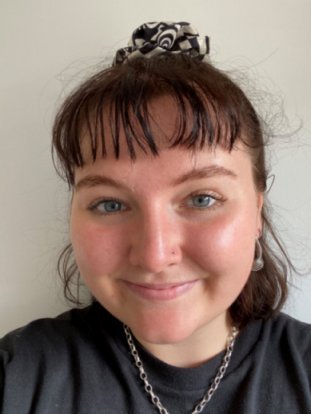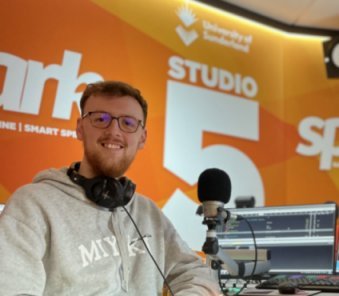2023 Winners
On 26 April the five winners of the 2023 Charles Parker Prize were announced by Hugh Levinson, BBC Radio 4’s Commissioning Editor for Factual Programmes. The five winning features were broadcast in the New Storytellers Series on BBC Radio 4 in August 2023 and will continue to be available, as are the winning features from previous years.
This year the judges were Redzi Barnard, Felicity Finch, Hugh Levinson, Gillian Reynolds, Philip Sellars, Anishka Sharma and Simon Elmes (chair). Here are the results and the judges’ citations for the five winners and six others who were nominated for the Prize.
Gold Award
Our Dad – Thea Rickard, Goldsmith’s, University of London
Thea’s programme is a joint effort by Thea’s siblings to explore and perhaps explain the strange and often violent life of their late father. Judges called it “captivating and horrifying”, “well-written and considered,” “a properly structured and layered piece.” “It’s brutal,” “with a story to tell and a way of unfolding it that keeps you listening.” “Shocking, open, honest – chilling and tender by turns with excellent use of sound and music.” “I loved the self-doubt, the pain, the empathy, the tainting nature of the dilemma that all were involved with.”
Prizewinners
The Final Fanfayre – Dom Brown, University of Sunderland
Dom tells a joyous story of a group of fans of the Osmonds pop group, from way back. The schoolgirls won a competition to record a song about their idols – called ‘I Want to be Donny’s Girl’. The judges said: “what a blast!” “An Interesting subject, well put together” and “evocative of the time. This simple piece works brilliantly because of the sheer power of the women’s reminiscences.”
Disappearing Birds – Petra Robyn Jones, University of the West of England
Petra focused on the fate of house martins, celebrated their beauty and examined their declining numbers through a group of persuasive speakers. Judges said it was “well executed with good use of sound”; “the stories are engrossing and touching: Moving, insightful, surprising and sometimes shocking.”
Harassment Architecture – George Ruskin, Goldsmiths, University of London
George told the story of a homeless man’s experience of how the world is designed to make his existence even harder. The judges commented “what is excellent about this piece is the perspective. It makes the listener see the world from one – singular – point of view, with wonderful stereo illustrations to bring the words to life.”
Out at Sea, Out of Mind – Lottie Steele, University of Sunderland
Lottie’s piece reflected the undersea sound world of whales, fish and crustaceans and the threats that human sounds cause to their environment. It was, in the words of the judges, “skilfully creative” and “expertly montaged so that there is a great sense of flow”. They admired the “beautiful use of sound and music. A shocking and important programme.”
Other Nominees
Amongst the Sheep – Kieran Davis, University of Salford
This programme dealt not with ewes and lambs but with those diagnosed with autism. Kieran takes himself as his subject matter and entertainingly explores the condition, in a programme the judges called “friendly and playful, with some charm.” They enjoyed the “entertaining narration and interviewees – a production with considerable flair.”
Losing Faith – Annie Keates, Goldsmith’s, University of London
Annie tells the story of a woman who was brought up in a family of devout Jehovah’s Witnesses, but who, as a teenager, lost her faith and left the order, putting huge strain on her family. Judges praised this “really good piece - I was engaged throughout” “a horrific story – of how the religion controls its members. A fascinating subject.”
Family Tree – Lydia Kenny, University College, London
In Lydia’s programme, the dad was a serial womaniser who’s found to have had several relationships in his lifetime which had resulted in hitherto undiscovered children. Judges liked the ‘mystery element’; “it‘s delicately and beautifully made, and unfolds simply and mysteriously, an excellent piece, brilliantly structured.
Olly – Matthew Temporal, Goldsmith’s, University of London
Matthew presents the testimony of 95-year old Olwen Pratt. Olwen’s young life in Yorkshire was marked by hardship and brutality, often at the hands of her father. Judges praised the programme’s “emotional intensity… the violence is shocking but Olwen is a great storyteller”. “I'm so moved,” remarked another judge. “It's so horribly dark, I had to listen twice.”
Irish – Alice Whaley, Goldsmiths, University of London
Alice’s piece talks to people for whom the language represents far more than simply a means of communication. It’s a life force, in effect. Our six judges said of this programme: “Beautiful and evocative use of music and language” with “very strong speakers” who “express themselves with warmth and colour and are well recorded.”
You can see all the nominees talking about their features to Sara Parker in a video interview.







